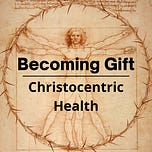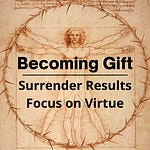The episode focuses on bodily health and stewardship. The central theme is how Catholics can respect the life of the body without making it an absolute value or idol. The episode introduces the concept of stewardship as the core idea for achieving this balance.
Key Takeaways:
• CCC 2289 “If morality requires respect for the life of the body, it does not make it an absolute value. It rejects a neo-pagan notion that tends to promote the cult of the body, to sacrifice everything for its sake, to idolize physical perfection and success at sports. By its selective preference of the strong over the weak, such a conception can lead to the perversion of human relationships.”
• The core concept is Catholic stewardship. Stewardship is presented as a basic posture or relationship toward creation. This involves acknowledging that created things, including our bodies, have their own meaning and dignity that we can discover by encountering them.
• The body is not merely a means to an end. A view (associated with classical liberalism) that the world's "stuff" is neutral and humans can assign meaning and do whatever they want with it is contrary to the Catholic view of stewardship. Applying this neutral understanding to the body can lead to ideologies like transhumanism. Encountering God's creation reveals His design and helps us understand ourselves more fully, implying a responsibility towards it, not just free use or abuse.
• Using the body as a means to an end is not true stewardship. This can include seeking various types of pleasure (e.g., through overeating, excessive sleeping, lust) or using physical attractiveness for external validation, specific relationships, compliments, or out of vanity. Such uses, even under the guise of health, can be vice.
• The true end for a human person is to know, love, and serve God and love our neighbor as ourselves. This is the end we should discover when we encounter our own body and ourselves as whole human persons. Even martyrdom is not contradictory to stewarding the body, as giving one's whole self for love (especially God) serves the body's true end.
• Finding balance is key. Virtue lies in the mean, and prudence helps discern how to care for the body without obsessing over health.
• Prioritizing higher duties helps maintain balance. A practical tip is recognizing that neglecting higher duties (like loving God, spouse, children, family, living one's faith, mission) for lower ones (like health routines) indicates that things are out of order.
• Modernity presents unique challenges. Historically, external environmental boundaries limited consumption. Modern society practically provides us with the limitless ability to consume" (like a modern supermarket), has brought humans into a "quasi garden" state, making it much harder to exercise self-limitation. Humans historically flourished with environmental boundaries.
• An examination of conscience can be applied to how we care for our bodies, including choices about eating, sleeping, exercise, and clothing.








Share this post